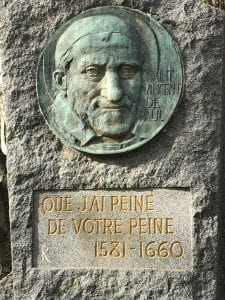Written By: Rachelle Kramer, D.Min., Director, Catholic Campus Ministry
 Each morning as I begin a new day, I find myself glancing at my phone and wondering what terrible headlines await on my news app. What denigrating actions have those in power taken today? What vulnerable populations are being targeted? My stomach churns, and I usually decide to postpone my quick perusal of headlines until after my morning routine, to begin the day on a more positive, if not hopeful, note. Moderating my intake of the news cycle has become an essential and necessary step to maintain my emotional and spiritual well-being these days, and I know I am not alone. These are, indeed, incredibly challenging and, dare I say, unprecedented times.
Each morning as I begin a new day, I find myself glancing at my phone and wondering what terrible headlines await on my news app. What denigrating actions have those in power taken today? What vulnerable populations are being targeted? My stomach churns, and I usually decide to postpone my quick perusal of headlines until after my morning routine, to begin the day on a more positive, if not hopeful, note. Moderating my intake of the news cycle has become an essential and necessary step to maintain my emotional and spiritual well-being these days, and I know I am not alone. These are, indeed, incredibly challenging and, dare I say, unprecedented times.
When I notice myself despairing and doomscrolling, I find it helpful to look to other inspiring figures who have also lived through challenging circumstances. One such individual—whom we celebrate at DePaul this week—is Saint Louise de Marillac, companion of Saint Vincent, co-founder of the Daughters of Charity, and trailblazer in her own time. Though living in a different era, Louise’s context in seventeenth-century France was also wrought with complexity and difficulty: wars, extreme poverty, political turmoil, and famine, to name a few. Not only that, Louise suffered tremendously in her life. An “illegitimate” child, Louise never knew her mother, and her father died when she was fifteen. Estranged from her family, she was denied admission to the convent (something she deeply desired), possessed frail health, had a son with special needs, and lost her husband in her early thirties.
Despite these challenges, Louise did not sit on the sidelines. Surrounded by overwhelming suffering and poverty, she got to work. Alongside her companion, Vincent, Louise used her tremendous leadership and organizational capabilities to found a religious community that, in a mere few decades, took charge of hospitals in Paris and the surrounding provinces; provided shelter for abandoned children, creating a whole new method of child care; oversaw ministries to the galley convicts; created a charitable warehouse that saved 193 villages during a period of famine; and started free elementary schools for girls in the Paris archdiocese, a stunning accomplishment during that time. [1]
How in the world did Louise accomplish all of this, given the many challenges and obstacles she must have faced, especially as a woman living in the 1600s? Without question, she was extremely gifted. But there is more to the story. Louise spoke often of her faith in God as her grounding for the work she did. Her spirituality was deeply shaped by the centrality of the Jesus crucified. [2] Having suffered tremendously in her own life, Louise had great compassion for those who experienced suffering, and she felt called to help alleviate it. In forming her community, she, “sought to fix the eyes of her Daughters on the suffering of Christ as the one whom they served in the poor.” [3] Thus, author Louise Sullivan describes Louise as, “a mystic with her feet solidly planted on the ground.” [4] How I love that image! She was a woman who lived in the world, rolled up her sleeves, and got to work, but that work was only possible because she was deeply rooted in something beyond herself—her faith. And it was that faith that provided the wellspring to continue doing the difficult work.
If there is anything we can learn from Louise during our present-day challenges, I believe it is this: we, too, can be “mystics with our feet solidly planted on the ground.” While we at DePaul do not all ascribe to Louise’s Christian faith, I do believe that we, too, need a well to draw from that is bigger than ourselves so that we can both persevere and take the actions needed during these troubling times. For some, that well is called God. For others, it is named in a sense of spirituality, or the interconnectedness of all humanity, or the inner conviction that living a life committed to justice, solidarity, and selflessness is worth living. Whatever that well is for you, hold fast to that. Be a mystic by taking time to pray, reflect, meditate, or sit in silence (lose the phone!)—whatever you need to tap into that Reality. We need this reservoir to get us through.
May the example of Louise inspire us to stay grounded in something beyond ourselves, to act, and to move forward in hope.
Questions for Reflection:
- Are there any changes I might make to my daily routine that will help me remain grounded during this unsettling time?
- What practice or practices would help me connect with that higher Reality?
- What am I being called to do in this moment?
Reflection by: Rachelle Kramer, D.Min., Director, Catholic Campus Ministry
[1] Louise Sullivan, “Louise de Marillac: A Spiritual Portrait” in Vincent de Paul and Louise de Marillac: Rules, Conferences, and Writing, ed. Frances Ryan and John E. Rybolt (New York: Paulist Press, 1995), 49–57.
[2] Sullivan, “Louise de Marillac,” 57–58.
[3] Ibid., 58.
[4] Ibid., 60.











